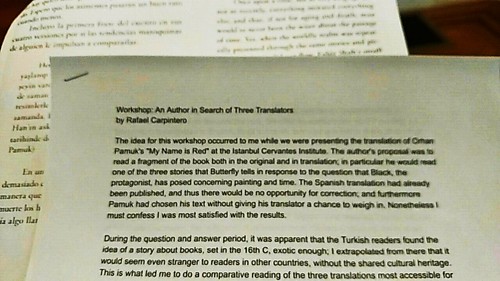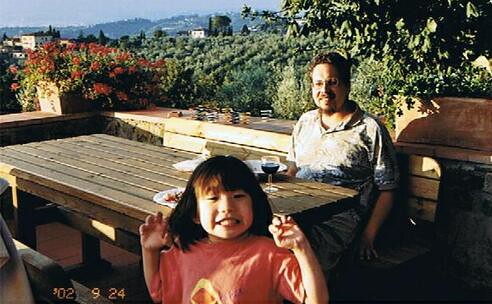|
|
Sunday, November 27th, 2022
One of the first poems I ever translated was "Der Novembertag," by Rainer Maria Rilke. The closing line of the poem has the wind in the chimney sounding out "eines Totenkarmens Schlussoktaven." I mistranslated this as "a death-karma's closing octaves" which has always struck me as a beautiful and enigmatic image...
This morning it occurred to me to mention this in my recently-created Mastodon account; and Mastodon came through! A couple of people suggested the archaic German Totencarmen, meaning "funerary song," obviously the correct interpretation.
Der Novembertag
Kalter Herbst vermag den Tag zu knebeln,
seine tausend Jubelstimmen schweigen;
hoch vom Domturm wimmern gar so eigen
Sterbeglocken in Novembernebeln.
Auf den nassen Daechern liegt verschlafen
weisses Dunstlicht; und mit kalten Händen
greift der Sturm in des Kamines Wänden
eines Totenkarmens Schlußoktaven.
The November Day
Cold autumn can muzzle the day,
silence its thousand jubilating voices;
from the steeple whimper, so peculiar,
death bells in November's mist.
On the wet rooftops lies sleeping
a white fog; and with cold hands
the storm inside the chimney's walls strikes
a lamentation's closing octaves.
posted morning of November 27th, 2022: Respond
➳ More posts about Rainer Maria Rilke
|  |
Tuesday, December first, 2020

Bastó un paso para que dejáramos atrás el siniestro, letal mandato del Trueno, atrás quedó el llamado Edén. (p. 47 I§6) [A single step was sufficient for us to leave behind Thunder's sinister, lethal commandment; the place called Eden lay behind us. I am here translating mandato as commandment for the biblical voice of it; other terms that might work are mandate and precinct. I am rendering el llamado Edén as the place called Eden; so-called Eden might be right.]
At the end of Book I of Eve's writings I have some questions. Primarily I am wondering about what commandment Eve and Adam have disobeyed. In Genesis 2:16-17, YHWH explicitly mandates that Adam and Eve may eat fruits of all the trees except his special one. But in this book, Thunder does not talk to Eve and Adam, at least not in clear sentences.After Eve and Adam eat the fruit, their senses are awakened and they begin to exist in Time. They are aware of their nakedness and have access to language (explicitly connected to being-in-time). When Eve tries to take leaves from the tree to cover her nakedness, the tree angrily refuses to allow her to take them (I§3), because she has disobeyed*. But what did she disobey? I reread the opening sections but find no commandment... Also: why does the tree give Eve its seed (I§6)?
I'm interested in the connection between language and being-in-time, and in what is the nature of this tree, as distinct from the rest of Eden. I will be looking to find out more about Eden in the coming books, though Eve and Adam have left Eden I expect Eve's memory of the expulsion will play an important role.
Eve says "Eden expelled us" (and not "Thunder expelled us from Eden") but then immediately says "It stank of dead animals, all we could do was leave." (p. 46) -- It is Eve and Adam that make the choice to leave. Covering their nakedness and leaving are the first two choices they make once they have begun to exist in Time.
 * A neighboring tree, which is presumably the Tree of Life, also refuses her. She is able to take leaves and branches from a third tree, a fig tree.
posted morning of December first, 2020: Respond
➳ More posts about El libro de Eva
|  |
Monday, November 30th, 2020
If I were translating El Libro de Eva, I would certainly use "thou/thee" and the appropriate conjugations to translate tú and its verbs. "¡desobediciste!" -> "thou hast disobeyed!", not "you have disobeyed!". (And not "thou disobeyedest", that's just silly) (In sections written as dialogue between Eve's narrative voice and an unseen interlocutor, "you" would be more appropriate.)
posted afternoon of November 30th, 2020: Respond
➳ More posts about Carmen Boullosa
|  |
Sunday, November 15th, 2020
I notice as I'm reading Schnee's translation of Texas that she skips over a clause here and there. For example, "dio muchos detalles y contó otros, hasta dijo que si Nepomuceno era el que había interceptado el correo, le colgó el bandidaje de los robines y quién sabe cuánto más." (p. 21) is translated as "He gave lots of details and made up others, even saying that it was Nepomuceno who had robbed the mail." (p. 7) Schnee even skips whole paragraphs. In the original, after the section which ends "Agua fuerte saca el puñal." comes
(Dos que anotar cuando el sol refulge en la hoja de metal del puñal de Agua Fuerte: al astro se le ve mejor y al acero parece no pesarle el astro. Parecería que el abrumado firmamento no puede con el peso del coloso; se diría que allá en lo alto está por resquebrajarse el azul, que la bóveda necesita compartir la carga con el velo del polvo terrestre y que el puñal pulido lleva al astro con ligereza.) (p. 25)
[(Two things to make note of, while the sun is shining off the metal sheet of Strong Water's blade: the star appears larger and the steel does not seem weighed down by the star. It would seem the firmament is overwhelmed, that it cannot bear the gargantuan weight; one could say there is a crack in the blue up there, that the vault of the heavens has to share its burden with the earthly cloud of dust and that the polished blade carries the star with ease.)] This word-for-word rendering is poor but gives an approximate sense The translation skips directly to the next section, beginning "Inside the Smiths' home, lovely Moonbeam gets back to work." (p. 9) It doesn't seem like the missing content is incorporated anywhere else... Not sure what to make of this. Possibly Schnee was working from a different edition than what I'm reading?
posted morning of November 15th, 2020: Respond
➳ More posts about Texas
|  |
Tuesday, March third, 2020
I am not making much headway with understanding the rest of the poem, but this image from Ernesto Mejía Sánchez' "Long Play/Boleros" leaps off the page at me:
TU ROSTRO se borra como el de la moneda en las yemas
del avaro
YOUR FEATURES worn away like those of the face of a coin
in a miser's fist 
posted evening of March third, 2020: Respond
➳ More posts about Readings
 |
Sunday, March 18th, 2018
Printed out my initial draft of the translation of "An Author in Search of Three Translators" this morning -- with the feeling that it's been too long a time since I did such a thing.

posted morning of March 18th, 2018: Respond
➳ More posts about Writing Projects
|  |
Saturday, March 17th, 2018
Once upon a time, not so very long ago and yet not so recently, everything imitated everything else, and thus, if not for aging and death, man would've never been the wiser about the passage of time.
It seems to me like this blog came into its own when I started reading Snow in 2007. While I was reading My Name is Red (directly afterwards), I did a Google search for the lovely quote above concerning aging and death, and happened on Rafael Carpintero's overview of his translation workshop, "Un autor en busca de tres traductores". Alas the article was in Spanish, a language I did not know, at the time, sufficiently to follow the full article.Well in the intervening ten years I've learned Spanish and have had occasional success as a translator... I'm currently starting to read The New Life in Carpintero's Spanish translation, and was led back to "Un autor en busca de tres traductores" -- long story short, I've gotten in touch with Carpintero and have obtained his permission to translate the article!
posted morning of March 17th, 2018: 1 response
➳ More posts about My Name is Red
|  |
Sunday, February 25th, 2018
Hey look at that! I translated a rhyming, metered poem, and preserved the rhyme and meter! Not sure that has ever happened before. Goethe inscribed this poem in a book given to his daughter (according to Blumenberg, the book was Johnson's Dictionary) --

My translation--
The books are thick! and full of stuff!
I'm never going to learn enough!
If it won't come in my head,
I'll leave it in the book instead.
 (Note -- found this poem while reading Blumenberg's Care Crossing the River.)
posted evening of February 25th, 2018: 1 response
➳ More posts about Projects
|  |
Thursday, February 19th, 2015
One nice side benefit of the class I took last spring at la Universidad Desconocida was the chance to meet classmate Isabel Zapata. Today her "Canción de Cuna para Sonámbulos" is online at Limulus along with my translation. Check it out! A beautiful poem.
posted evening of February 19th, 2015: Respond
➳ More posts about Clips
|  |
Monday, November 17th, 2014
— My friend, you are a barbarian. You paint as if one eye were on the moon and the other on Mars. I don't like your work; but you have made me weep. And tears are the blood of sincerity. Cool -- two publications in a row of Marta Aponte Alsina translations! A story I translated last year is included in the November issue of The Acentos Review -- 1955: Lavender Mist.
posted evening of November 17th, 2014: Respond
➳ More posts about La casa de la loca
| Previous posts about Translation
Archives  | | |
|
Drop me a line! or, sign my Guestbook.
•
Check out Ellen's writing at Patch.com.
| |

